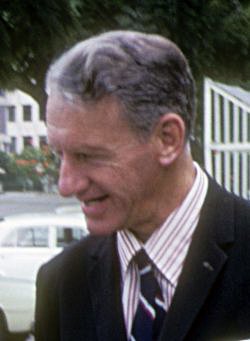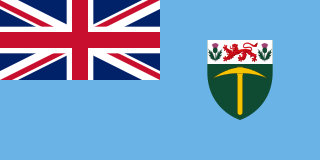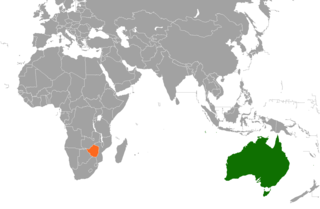
Rhodesia, officially from 1970 the Republic of Rhodesia, was an unrecognised state in Southern Africa from 1965 to 1979. During this fourteen-year period, Rhodesia served as the de facto successor state to the British colony of Southern Rhodesia, and in 1980 it became modern day Zimbabwe.

Ian Douglas Smith was a Rhodesian politician, farmer, and fighter pilot who served as Prime Minister of Rhodesia from 1964 to 1979. He was the country's first leader to be born and raised in Rhodesia, and led the predominantly white government that unilaterally declared independence from the United Kingdom in November 1965 in opposition to their demands for the implementation of majority rule as a condition for independence. His 15 years in power were defined by the country's international isolation and involvement in the Rhodesian Bush War, which pitted the Rhodesian Security Forces against the Soviet and Chinese-funded military wings of the Zimbabwe African National Union (ZANU) and Zimbabwe African People's Union (ZAPU).

Zimbabwe Rhodesia, alternatively known as Zimbabwe-Rhodesia, also informally known as Zimbabwe or Rhodesia, was a short-lived sovereign state that existed from 1 June 1979 to 18 April 1980, though it lacked international recognition. Zimbabwe Rhodesia was preceded by another state named the Republic of Rhodesia and was briefly under a British-supervised transitional government sometimes referred to as a reestablished Southern Rhodesia, which according to British constitutional theory had remained the lawful government in the area after Unilateral Declaration of Independence (UDI) in 1965. Following the 1980 Southern Rhodesian general election, the country was granted internationally-recognized independence within the Commonwealth as the Republic of Zimbabwe.

Rhodesia's Unilateral Declaration of Independence (UDI) was a statement adopted by the Cabinet of Rhodesia on 11 November 1965, announcing that Rhodesia, a British territory in southern Africa that had governed itself since 1923, now regarded itself as an independent sovereign state. The culmination of a protracted dispute between the British and Rhodesian governments regarding the terms under which the latter could become fully independent, it was the first unilateral break from the United Kingdom by one of its colonies since the United States Declaration of Independence in 1776. The UK, the Commonwealth, and the United Nations all deemed Rhodesia's UDI illegal, and economic sanctions, the first in the UN's history, were imposed on the breakaway colony. With the help of the Commonwealth Secretariat, members of the Commonwealth were able to cooperate and advise Rhodesian Africans on policy. Amid near-complete international isolation, Rhodesia continued as an unrecognised state with the assistance of South Africa and Portugal.

The Internal Settlement was an agreement which was signed on 3 March 1978 between Prime Minister of Rhodesia Ian Smith and the moderate African nationalist leaders comprising Bishop Abel Muzorewa, Ndabaningi Sithole and Senator Chief Jeremiah Chirau. After almost 15 years of the Rhodesian Bush War, and under pressure from the sanctions placed on Rhodesia by the international community, and political pressure from South Africa, the United Kingdom, and the United States, the Rhodesian government met with some of the internally based moderate African nationalist leaders in order to reach an agreement on the political future for the country.

The history of Rhodesia from 1965 to 1979 covers Rhodesia's time as a state unrecognised by the international community following the predominantly white minority government's Unilateral Declaration of Independence on 11 November 1965. Headed by Prime Minister Ian Smith, the Rhodesian Front remained in government until 1 June 1979, when the country was reconstituted as Zimbabwe Rhodesia.

A double referendum was held in Rhodesia on 20 June 1969, in which voters were asked whether they were in favour of or against a) the adoption of a republican form of government, and b) the proposals for a new Constitution, as set out in a white paper and published in a Gazette Extraordinary on 21 May 1969. Both proposals were approved. The country was subsequently declared a republic on 2 March 1970.
During the 1960s, many independence movements emerged in countries near Rhodesia, which had significant effects on political affairs and social conditions within Rhodesia.

Foreign relations exist between Australia and Zimbabwe. Both countries have full embassy level diplomatic relations. Australia maintains an embassy in Harare, and Zimbabwe maintains an embassy in Canberra.

The Federation of Rhodesia and Nyasaland, also known as the Central African Federation (CAF), was a colonial federation that consisted of three southern African territories: the self-governing British colony of Southern Rhodesia and the British protectorates of Northern Rhodesia and Nyasaland. It existed between 1953 and 1963.

Zimbabwe and the Commonwealth of Nations have had a controversial and stormy diplomatic relationship. Zimbabwe is a former member of the Commonwealth, having withdrawn in 2003, and the issue of Zimbabwe has repeatedly taken centre stage in the Commonwealth, both since Zimbabwe's independence and as part of the British Empire.

Commonwealth Prime Ministers' Conferences were biennial meetings of Prime Ministers of the United Kingdom and the Dominion members of the British Commonwealth of Nations. Seventeen Commonwealth Prime Ministers' Conferences were held between 1944 and 1969. As well, the prime ministers met for a Commonwealth Economic Conference in 1952. These series of conferences were a continuation and regularisation of the earlier Imperial Conferences which had been held periodically from 1887 to 1937. Since 1971, Commonwealth Heads of Government Meetings have been held.

The 1973 Commonwealth Heads of Government Meeting, officially known as the II Commonwealth Heads Meeting, and commonly known as Ottawa 1973, was the second Meeting of the Heads of Government of the Commonwealth of Nations. It was held from 2 to 10 August 1973 in Ottawa, hosted by Prime Minister Pierre Trudeau. It was the first CHOGM to be attended by the Head of the Commonwealth, Elizabeth II.

The modern political history of Zimbabwe starts with the arrival of white people to what was dubbed Southern Rhodesia in the 1890s. The country was initially run by an administrator appointed by the British South Africa Company. The prime ministerial role was first created in October 1923, when the country achieved responsible government, with Sir Charles Coghlan as its first Premier. The third premier, George Mitchell, renamed the post prime minister in 1933.

The Rhodesian mission in Lisbon, the capital of Portugal, operated from September 1965 to May 1975. It was a diplomatic mission representing Rhodesia, initially as a self-governing colony of Britain and, after the Unilateral Declaration of Independence in November 1965, as an unrecognised state. Rhodesia informed Britain of its intent to open a Lisbon mission headed by an accredited representative, independent from the British Embassy in the city, in June 1965. Whitehall refused to endorse the idea but Rhodesia continued nonetheless, and later that month appointed Harry Reedman to head the mission. The British government attempted unsuccessfully to block this unilateral act—Rhodesia's first—for some months afterwards.
The 1969 Commonwealth Prime Ministers' Conference was the 17th Meeting of the Heads of Government of the Commonwealth of Nations. It was held in the United Kingdom in January 1969, and was hosted by that country's Prime Minister, Harold Wilson.
The 1964 Commonwealth Prime Ministers' Conference was the 13th Meeting of the Heads of Government of the Commonwealth of Nations. It was held in the United Kingdom in July 1964, and was hosted by the UK's Prime Minister, Sir Alec Douglas-Home.
The January 1966 Commonwealth Prime Ministers' Conference was the 15th Meeting of the Heads of Government of the Commonwealth of Nations. It was the first such meeting to be held outside of the United Kingdom, being held in Lagos, Nigeria, and was hosted by that country's Prime Minister, Sir Abubakar Tafawa Balewa.
The 1965 Commonwealth Prime Ministers' Conference was the 14th Meeting of the Heads of Government of the Commonwealth of Nations. It was held in the United Kingdom in June 1965, and was hosted by that country's Prime Minister, Harold Wilson.

Queen of Rhodesia was the title asserted for Elizabeth II as Rhodesia's constitutional head of state following the country's Unilateral Declaration of Independence from the United Kingdom. However, the position only existed under the Rhodesian constitution of 1965 and remained unrecognised elsewhere in the world. The British government, along with the United Nations and almost all governments, regarded the declaration of independence as an illegal act and nowhere else was the existence of the British monarch having separate status in Rhodesia accepted. With Rhodesia becoming a republic in 1970, the status or existence of the office ceased to be contestable.











